英语一般将来时
- 格式:docx
- 大小:20.71 KB
- 文档页数:3
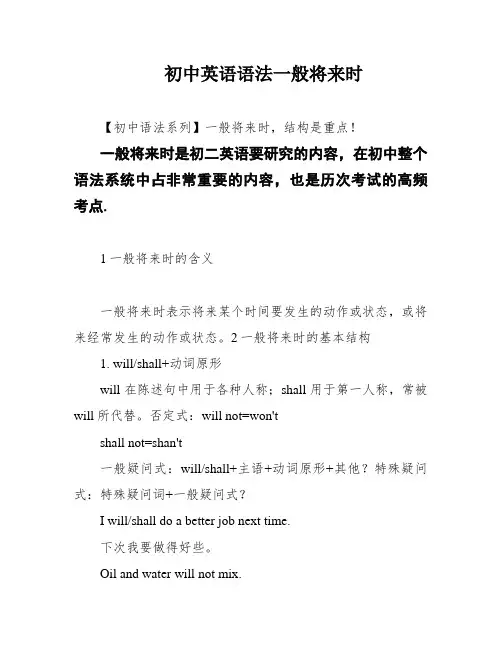
初中英语语法一般将来时【初中语法系列】一般将来时,结构是重点!一般将来时是初二英语要研究的内容,在初中整个语法系统中占非常重要的内容,也是历次考试的高频考点.1一般将来时的含义一般将来时表示将来某个时间要发生的动作或状态,或将来经常发生的动作或状态。
2一般将来时的基本结构1. will/shall+动词原形will在陈述句中用于各种人称;shall用于第一人称,常被will所代替。
否定式:will not=won'tshall not=shan't一般疑问式:will/shall+主语+动词原形+其他?特殊疑问式:特殊疑问词+一般疑问式?I will/shall do a better job next time.下次我要做得好些。
Oil and water will not mix.油和水没法混在一起。
—Will he help you with your English tonight?今天晚上他会帮助你研究英语吗?—Yes, he will./No, he won't.是的,他会。
/不,他不会。
—When will you arrive for America?你什么时候去美国?—Tomorrow.来日诰日。
2. am/is/are going to +动词原形否认式:am/is/are not going to +动词真相普通疑问式:am/is/are +主语+ going to +动词真相+其他?特殊疑问式:特殊疑问词+普通疑问式?He is going to spend his holidays in London.他打算在伦敦度假。
Look at the dark clouds. There is going to be a storm.看那乌云,快要下雨了。
Is he going to collect any data for us?他会帮我们搜集数据吗?What are you going to do tomorrow?明天你打算作什么?3will+动词原形与am/is/are going to +动词原形的用法区别will+动词原形与am/is/are going to +动词原形的用法虽然都表示将来发生动作或情况,一般情况下能互换。
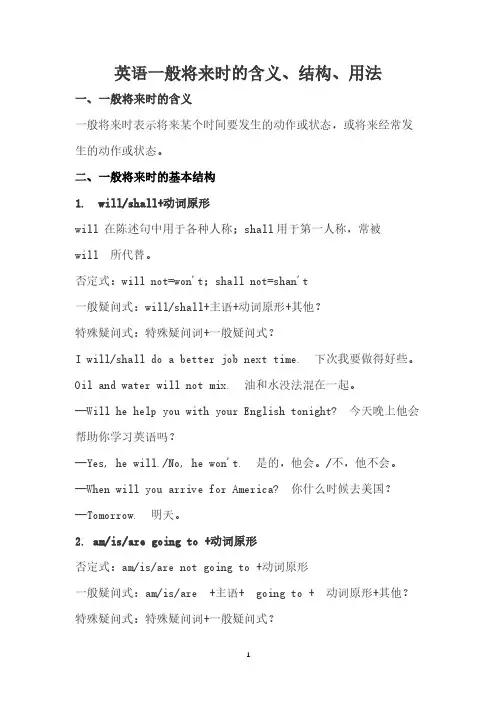
英语一般将来时的含义、结构、用法一、一般将来时的含义一般将来时表示将来某个时间要发生的动作或状态,或将来经常发生的动作或状态。
二、一般将来时的基本结构1. will/shall+动词原形will 在陈述句中用于各种人称;shall用于第一人称,常被will 所代替。
否定式:will not=won't;shall not=shan't一般疑问式:will/shall+主语+动词原形+其他?特殊疑问式:特殊疑问词+一般疑问式?I will/shall do a better job next time. 下次我要做得好些。
Oil and water will not mix. 油和水没法混在一起。
—Will he help you with your English tonight? 今天晚上他会帮助你学习英语吗?—Yes, he will./No, he won't. 是的,他会。
/不,他不会。
—When will you arrive for America? 你什么时候去美国?—Tomorrow. 明天。
2. am/is/are going to +动词原形否定式:am/is/are not going to +动词原形一般疑问式:am/is/are +主语+ going to + 动词原形+其他?特殊疑问式:特殊疑问词+一般疑问式?He is going to spend his holidays in London. 他打算在伦敦度假。
Look at the dark clouds. There is going to be a storm. 看那乌云,快要下雨了。
Is he going to collect any data for us? 他会帮我们收集数据吗?What are you going to do tomorrow? 明天你打算作什么?三、一般将来时的用法will+动词原形与am/is/are going to +动词原形的用法虽然都表示将来发生动作或情况,一般情况下能互换。
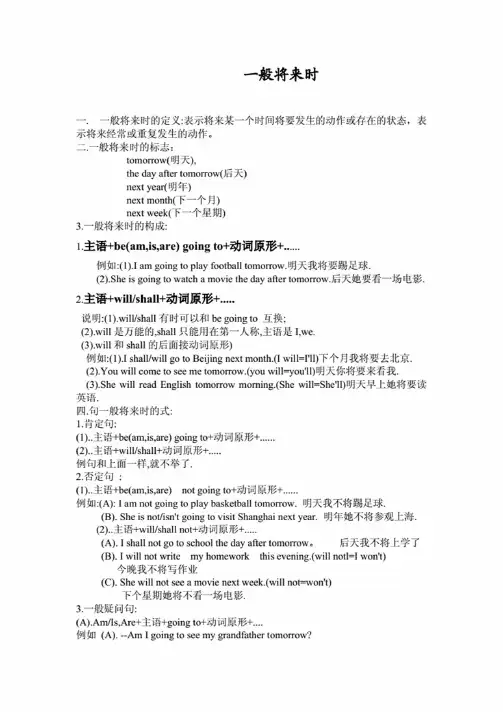
一般将来时一.一般将来时的定义:表示将来某一个时间将要发生的动作或存在的状态,表示将来经常或重复发生的动作。
二.一般将来时的标志:tomorrow(明天),the day after tomorrow(后天)next year(明年)next month(T—个月)next week(下一个星期)3.一般将来时的构成:1.主语^be(am,is,are)going to+动词原形+..例如:(1).I am going to play football tomorrow.明天我将要踢足球.(2).She is going to watch a movie the day after tomorrow.后天她要看一场电影.2.主语+will/shall+动词原形+.....说明:(l).will/shall有时可以和be going to互换;(2) .will是万能的,shall只能用在第一人称,主语是I,we.(3) .will和shall的后而接动词原形)例如shall/will go to Beijing next month.。
will=I11)下个月我将要去北京.(2) .You will come to see me tomorrow.(you will=you'll)明天你将要来看我.(3) .She will read English tomorrow moming.(She will=She'll)明天早上她将要读英语.四.句一般将来时的式:1.肯定句:(1) ..主语+be(am,is,are)going to+动词原形+......(2) ..主语+will/shall+动词原形+.....例句和上面一样,就不举了.2.否定句:(1)..主语+be(am,is,are)not going to+动词原形+......例如:(A):I am not going to play basketball tomorrow.明天我不将踢足球.(B).She is not/isn't going to visit Shanghai next year.明年她不将参观上海.(2)..主语+will/shall not+动词原形+.....(A).I shall not go to school the day after tomorrow o后天我不将上学了(B).I will not write my homework this evening.(will notl=I won't)今晚我不将写作业(C).She will not see a movie next week.(will not=won't)下个星期她将不看一场电影.3.一般疑问句:(A).Am/Is,Are+主语+going to+动词原形+....例如(A).—Am I going to see my grandfather tomorrow?明天我将去看我的爷爷吗?—Yes,you are.是的,你将去.(B).— Are you going to listening to the tape tomorrow?明天你将听录音带吗?—No,I am not.不,我不将.(C). —Is she going to Beijing next year? 明年我将去北京吗?-Yes,she is.是的,她将.(2).Will//shall+主语+动词原形+…例如(A). —Shall we play volleyball next class?下一节课我们将打排球吗?-Yes,you will,是的,你们将.(B). —Will you come here next week?下个星期你将来这儿吗?-Yes,I will.是的,我将.(C).--Will she teach us this term?这学期,她将教我们吗?—Yes,she will.是的,她将.4.特殊疑问句:(1).What(Where,How...)+be(am,is,are)+主语+going to+动词原形+...?例如:(A).—What are you going to do tomorrow? 明天你将要做什么?—rm going to the park? 我将要去动物园.(B).--Where are you going to swim? 你将要去哪儿游泳?—I'm going to swim in the river.(2). What(When,Where,How...)+主语+动词原形+...?例如:(A).---What will you do next week?下个星期你将要做什么?--1 will do my homeworko 我将要做作业.(B).—How will she come here tomorrow?明天她将要怎么来这儿?—She will come here by bus 。
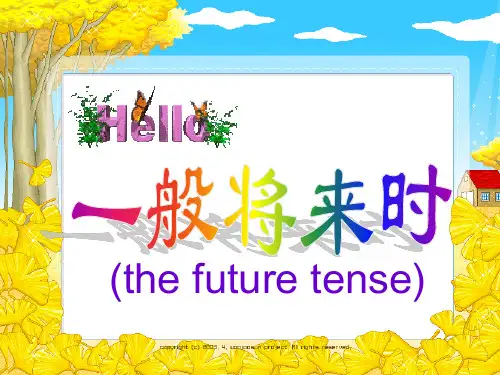
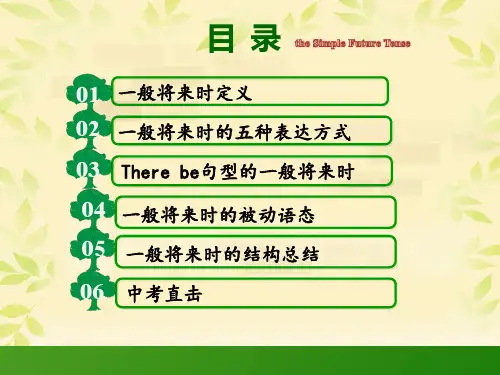
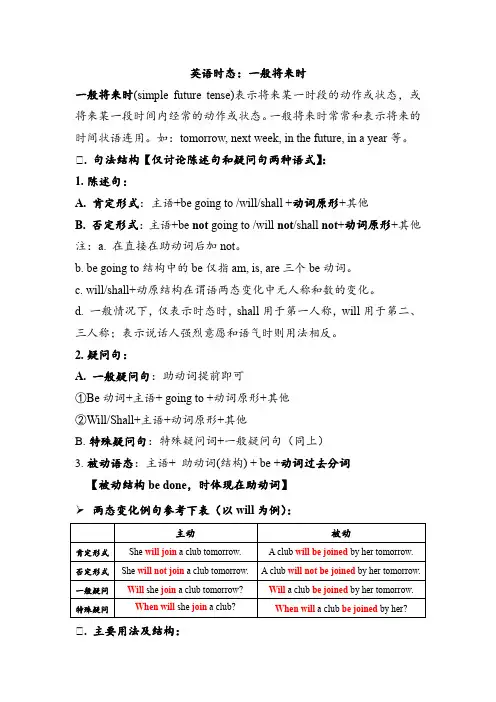
英语时态:一般将来时一般将来时(simple future tense)表示将来某一时段的动作或状态,或将来某一段时间内经常的动作或状态。
一般将来时常常和表示将来的时间状语连用。
如:tomorrow, next week, in the future, in a year等。
Ⅰ. 句法结构【仅讨论陈述句和疑问句两种语式】:1.陈述句:A. 肯定形式:主语+be going to /will/shall +动词原形+其他B. 否定形式:主语+be not going to /will not/shall not+动词原形+其他注:a. 在直接在助动词后加not。
b. be going to结构中的be仅指am, is, are三个be动词。
c. will/shall+动原结构在谓语两态变化中无人称和数的变化。
d. 一般情况下,仅表示时态时,shall用于第一人称,will用于第二、三人称;表示说话人强烈意愿和语气时则用法相反。
2.疑问句:A. 一般疑问句:助动词提前即可①Be动词+主语+ going to +动词原形+其他②Will/Shall+主语+动词原形+其他B.特殊疑问句:特殊疑问词+一般疑问句(同上)3.被动语态:主语+ 助动词(结构) + be +动词过去分词【被动结构be done,时体现在助动词】➢两态变化例句参考下表(以will为例):Ⅰ. 主要用法及结构:1.【一般将来时表将来】一般将来时表示将要发生的动作或情况。
A.will/shall +动原I will(shall) arrive tomorrow.Will you be free tonight?B.be going to+动原a.表示计划、打算、准备做的事。
We are going to put up a building here.b.表示即将发生或肯定要发生的事。
I think it is going to snow.注:在一般将来时的句子中,有时有表示将来时间的状语,有时没有时间状语,这时要从意思上判断是否指未来的动作或情况。
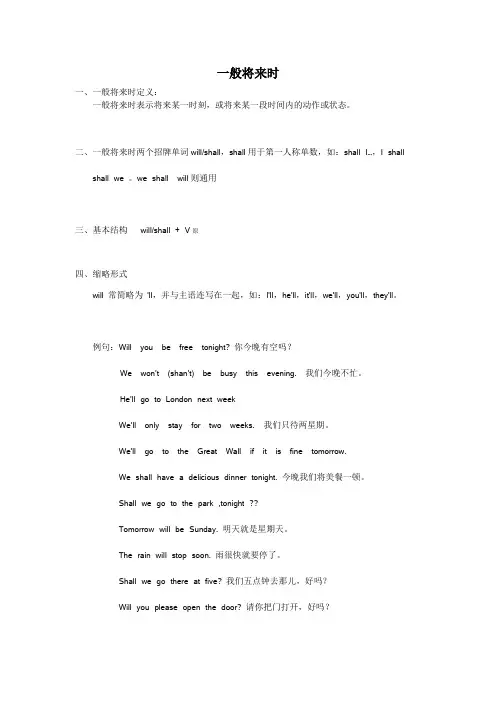
一般将来时一、一般将来时定义:一般将来时表示将来某一时刻,或将来某一段时间内的动作或状态。
二、一般将来时两个招牌单词will/shall,shall用于第一人称单数,如:shall I…,I shallshall we 。
we shall will则通用三、基本结构will/shall + V原四、缩略形式will 常简略为'll,并与主语连写在一起,如:I'll,he'll,it'll,we'll,you'll,they'll。
例句:Will you be free tonight? 你今晚有空吗?We won’t(shan’t) be busy this evening. 我们今晚不忙。
He’ll go to London next weekWe’ll only stay for two weeks. 我们只待两星期。
We’ll go to the Great Wall if it is fine tomorrow.We shall have a delicious dinner tonight. 今晚我们将美餐一顿。
Shall we go to the park ,tonight ??Tomorrow will be Sunday. 明天就是星期天。
The rain will stop soon. 雨很快就要停了。
Shall we go there at five? 我们五点钟去那儿,好吗?Will you please open the door? 请你把门打开,好吗?五、用法基本用法:“助动词will或shall+动词原形”这一形式,表示将来发生的事情,用于征求对方的意见或表示客气的邀请。
在口语中will用于所有人称,书面语中第一人称常用shall。
如:I can see you're busy, so I won't stay long.我看得出你很忙,所以我不会呆太久。
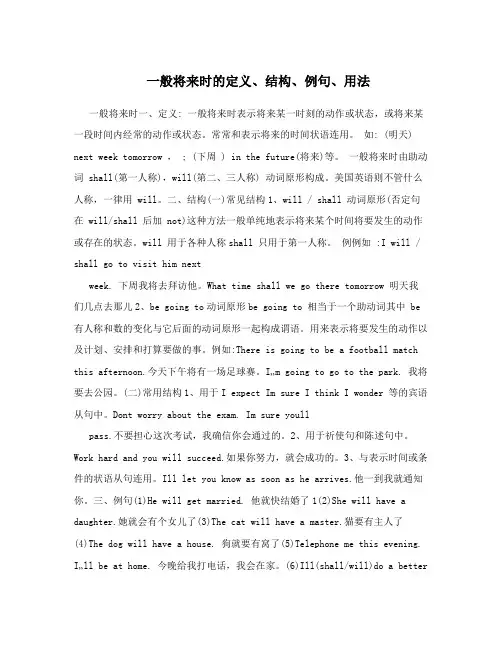
一般将来时的定义、结构、例句、用法一般将来时一、定义: 一般将来时表示将来某一时刻的动作或状态,或将来某一段时间内经常的动作或状态。
常常和表示将来的时间状语连用。
如: (明天) next week tomorrow , ; (下周 ) in the future(将来)等。
一般将来时由助动词 shall(第一人称),will(第二、三人称) 动词原形构成。
美国英语则不管什么人称,一律用 will。
二、结构(一)常见结构1、will / shall 动词原形(否定句在 will/shall 后加 not)这种方法一般单纯地表示将来某个时间将要发生的动作或存在的状态。
will 用于各种人称shall 只用于第一人称。
例例如 :I will / shall go to visit him nextweek. 下周我将去拜访他。
What time shall we go there tomorrow 明天我们几点去那儿2、be going to动词原形be going to 相当于一个助动词其中 be 有人称和数的变化与它后面的动词原形一起构成谓语。
用来表示将要发生的动作以及计划、安排和打算要做的事。
例如:There is going to be a football match this afternoon.今天下午将有一场足球赛。
I…m going to go to the park. 我将要去公园。
(二)常用结构1、用于I expect Im sure I think I wonder 等的宾语从句中。
Dont worry about the exam. Im sure youllpass.不要担心这次考试,我确信你会通过的。
2、用于祈使句和陈述句中。
Work hard and you will succeed.如果你努力,就会成功的。
3、与表示时间或条件的状语从句连用。
Ill let you know as soon as he arrives.他一到我就通知你。
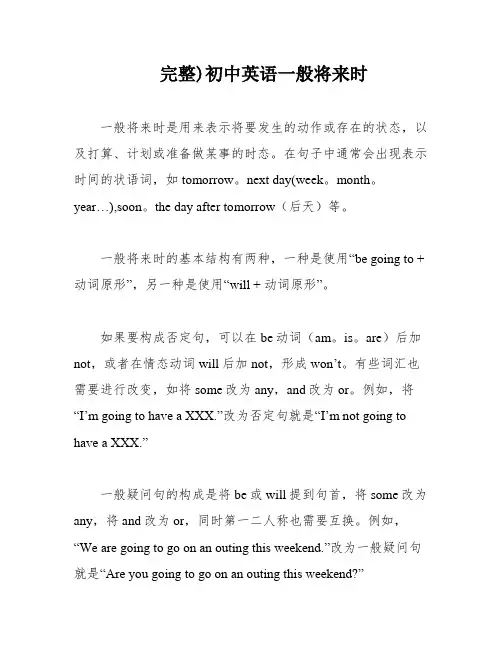
完整)初中英语一般将来时一般将来时是用来表示将要发生的动作或存在的状态,以及打算、计划或准备做某事的时态。
在句子中通常会出现表示时间的状语词,如tomorrow。
next day(week。
month。
year…),soon。
the day after tomorrow(后天)等。
一般将来时的基本结构有两种,一种是使用“be going to + 动词原形”,另一种是使用“will + 动词原形”。
如果要构成否定句,可以在be动词(am。
is。
are)后加not,或者在情态动词will后加not,形成won’t。
有些词汇也需要进行改变,如将some改为any,and改为or。
例如,将“I’m going to have a XXX.”改为否定句就是“I’m not going to have a XXX.”一般疑问句的构成是将be或will提到句首,将some改为any,将and改为or,同时第一二人称也需要互换。
例如,“We are going to go on an outing this weekend.”改为一般疑问句就是“Are you going to go on an outing this weekend?”对于划线部分的提问,一般将来时的对划线部分有三种情况。
第一种是问人,可以使用Who,例如“I’m going to New York soon.”改为问句就是“Who’s going to New York soon?”第二种是问干什么,可以使用What … do,例如“My father is going to watch a race with me this after noon.”改为问句就是“What is your father going to do with you this afternoon?”第三种是问什么时候,可以使用When,例如“She’s going to go to bed at nine.”改为问句就是“When is she going to bed?”同义句的构成是将be going to改为will,例如“I am going to go XXX.”可以改为“I will go XXX.”最基本的一般将来时结构是使用“will + 动词原形”,例如“XXX.”表示明天他们将要参观博物馆。
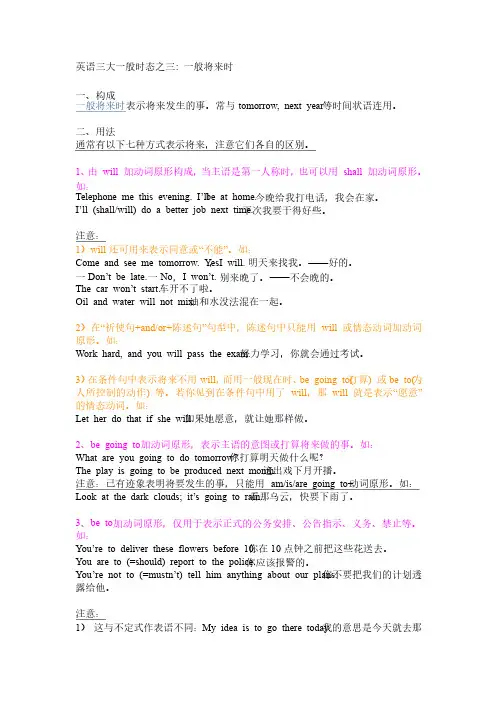
一般将来时英语三大一般时态之三: 一般将来时一、构成一、构成等时间状语连用。
一般将来时表示将来发生的事。
常与tomorrow, next year等时间状语连用。
二、用法二、用法通常有以下七种方式表示将来,注意它们各自的区别。
1、由will 加动词原形构成,当主语是第一人称时,也可以用shall 加动词原形。
如:Telephone me this evening. I’ll be at home. 今晚给我打电话,我会在家。
今晚给我打电话,我会在家。
I’ll (shall/will) do a better job next time. 下次我要干得好些。
下次我要干得好些。
注意:注意:1)will还可用来表示同意或“不能”。
如:Come and see me tomorrow. Yes,I will. 明天来找我。
——好的。
好的。
不会晚的。
一Don’t be late. 一No,I won’t. 别来晚了。
——不会晚的。
The car won’t start. 车开不了啦。
车开不了啦。
Oil and water will not mix. 油和水没法混在一起。
油和水没法混在一起。
2)在“祈使句+and/or+陈述句”句型中,陈述句中只能用will或情态动词加动词原形。
如:Work hard, and you will pass the exam. 努力学习,你就会通过考试。
努力学习,你就会通过考试。
3)在条件句中表示将来不用will,而用一般现在时、be going to(打算) 或be to(为人所控制的动作) 等。
若你见到在条件句中用了will,那will 就是表示“愿意”的情态动词。
如:Let her do that if she will. 如果她愿意,就让她那样做。
如果她愿意,就让她那样做。
2、be going to 加动词原形,表示主语的意图或打算将来做的事。
如:加动词原形,表示主语的意图或打算将来做的事。
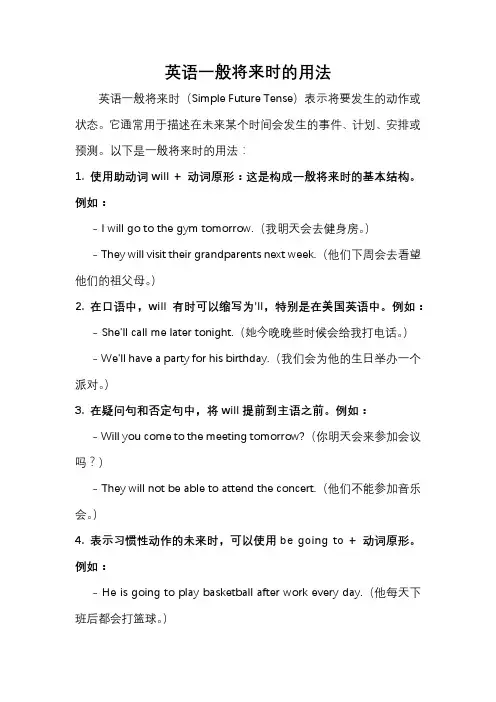
英语一般将来时的用法英语一般将来时(Simple Future Tense)表示将要发生的动作或状态。
它通常用于描述在未来某个时间会发生的事件、计划、安排或预测。
以下是一般将来时的用法:1. 使用助动词will + 动词原形:这是构成一般将来时的基本结构。
例如:- I will go to the gym tomorrow.(我明天会去健身房。
)- They will visit their grandparents next week.(他们下周会去看望他们的祖父母。
)2. 在口语中,will有时可以缩写为'll,特别是在美国英语中。
例如:- She'll call me later tonight.(她今晚晚些时候会给我打电话。
)- We'll have a party for his birthday.(我们会为他的生日举办一个派对。
)3. 在疑问句和否定句中,将will提前到主语之前。
例如:- Will you come to the meeting tomorrow?(你明天会来参加会议吗?)- They will not be able to attend the concert.(他们不能参加音乐会。
)4. 表示习惯性动作的未来时,可以使用be going to + 动词原形。
例如:- He is going to play basketball after work every day.(他每天下班后都会打篮球。
)- She is going to study abroad next year.(她明年打算出国留学。
)5. 表示按计划或安排将要发生的事情,可以使用现在进行时。
例如:- The train is leaving at 6 pm.(火车将在下午6点离开。
)- The concert starts in an hour.(音乐会一小时后开始。
)6. 表示预测或推测未来可能发生的情况,可以使用情态动词may, might, could, should, must等。
一般将来时的用法及常见句型总结一般将来时是英语中用来表示将来发生的动作或状态的一种时态。
在句子中,一般将来时通常与表示将来的时间状语词搭配使用,如tomorrow(明天)、next week(下周)、in the future(将来)等。
同时,一般将来时也可以使用助动词will或shall来构成。
下面将介绍一般将来时的用法及常见句型。
1. 一般将来时的肯定句结构:主语 + will/shall + 动词原形 + 其他成分例如:- I will go to the park tomorrow.(我明天将去公园。
)- They will watch a movie tonight.(他们今晚将要看电影。
)2. 一般将来时的否定句结构:主语 + will/shall + not + 动词原形 + 其他成分例如:- She will not join the party.(她不会参加派对。
)- We shall not travel to Europe.(我们不会去欧洲旅行。
)3. 一般将来时的疑问句结构:Will/Shall + 主语 + 动词原形 + 其他成分?- Will you come to the concert?(你会来听音乐会吗?)- Shall we visit the museum tomorrow?(我们明天要参观博物馆吗?)4. 一般将来时的特殊用法:a. 表示计划或安排例如:- We will have a meeting next Monday.(我们下周一要开会。
)- They will go on a vacation in August.(他们八月份将去度假。
)b. 表示意愿或意图例如:- He will help you with your homework.(他愿意帮你做作业。
)- She shall buy a new car soon.(她打算很快买辆新车。
)c. 表示预测或推断例如:- It will rain tomorrow.(明天会下雨。
一般将来时(The Simple Future tense)一般将来时指立足于现在,描述将要发生的事情,表示将来某一时刻的动作或状态,或将来某一段时间内经常的动作或状态。
常常和表示将来的时间状语连用。
如:tomorrow(明天),next week(下周);in the future(将来)等。
一般将来时由助动词shall(第一人称),will(第二、三人称)动词原形构成。
美式英语则不管什么人称,一律用will。
或用主语+be动词+ going to 动词。
一、构成(一)be going to 结构be going to 是一般将来时的一种固定结构,它后面要接动词原形,用来表示按计划或安排要发生的动作,有时也可以表示推测将要或肯定会发生的动作,有“准备;打算”的意思。
含有be going to 结构的句子中往往有表示将来的时间状语。
I am going to move to another school next term.下学期我要搬到另一家学校。
He is not going to come to the get-together tomorrow. 他不打算参加明天的聚会了。
——Are they going to leave for Australia next week? 他们下周打算出发到澳大利亚吗?——Yes , they are. / No , they aren’t .是的。
/不。
What are you going to do this evening ?今晚你打算干什么?(二)will 结构I will finish all the housework very soon.我很快就会完成这些家务活。
They won’t move away until tomorrow.他们明天才搬走。
——Will Mr. white give us a lecture tomorrow ?史密斯先生明天给我们作讲座吗?——Yes, he will ./ No , he won’t .是的。
英语一般将来时知识点一、一般将来时表示将要发生的动作或存在的状态及打算、计划或准备做某事。
一般将来时由助动词shall或will 加动词原型构成,shall用于第一人称,will用于第二、三人称。
二.时间状语:tomorrow, next day(week, month, year…),soon, in a few minutes, by…,the day after tomorrow, etc.三.基本结构:1、肯定句主语+am/is/are+going to + do;will/shall + do.2.否定形式:am/is/are not going to do ;will/shall not do。
3.一般疑问句:be放于句首;will/shall提到句首。
例句:They are going to have a competition with us in studies.他们将有一场比赛和我们一起研究。
It is going to rain.天要下雨了。
四、注意1、在时间或条件状语从句中,一般不能用将来时态,而用现在时态代替:they’ll fight till they win complete victory.i’ll be round to see you if i have time tomorrow.2、表示将要发生的动作或情况,除了一般将来时外,还有一些其他结构和时态:①.be going +不定式(表打算、准备作的事或即将发生或肯定要发生的事):we ‘re going to put up a building here.how are you going to spend your holiday?who is going to speak first?②. be +不定式(表示按计划安排要发生的事或用来征求对方的意见):when is the factory to go into production?the line is (going) to be opened to traffic next week.am i to (=shall i ) go on with the work?③.一般现在时(限于某些动词,表示按计划或时刻要发生的事):school finishes on january 18th.we get off at the next stop.when does the winter vacation begin?④.现在进行时(限于某些动词,表示按计划安排要发生的事):we are having an english evening tonight.they are playing some folk music next.i am talking the children to the zoo (on sunday ).3、在表示打算或准备时,如不提时间、条件等,多用be going to这个结构,用一般将来时时很少的,特别是在口语中:he is going to buy a dictionary.(很少说he will buy a dictionary.)在谈即将发生的情况时,用be going to 这个结构也多一些。
英语一般将来时的语法
英语一般将来时的语法
一般将来时通常是be going to +不定式的形式或者be +不定式表将来及be about to +不定式。
1) shall用于第一人称,常被will 所代替。
will 在陈述句中用于各人称,在争求意见时常用于第二人称。
Which paragraph shall I read first.
Will you be at home at seven this evening?
2) be going to +不定式,表示将来。
a. 主语的意图,即将做某事。
What are you going to do tomorrow?
b. 计划,安排要发生的事。
The play is going to be produced next month。
c. 有迹象要发生的事
Look at the dark clouds, there is going to be a storm.
3) be +不定式表将来,按计划或正式安排将发生的事。
We are to discuss the report next Saturday.
4) be about to +不定式,意为马上做某事。
He is about to leave for Beijing.
注意:be about to 不能与tomorrow, next week 等表示明确将来时的'时间状语连用。
上述四种表示一般将来时的四种结构,同学们是不是理解了呢?这对于一般将来时的学习很重要哦!
【英语一般将来时的语法】。
英语一般将来时一、概念:表示将要发生的动作或存在的状态及打算、计划或准备做某事。
句中一般有以下时间状语:tomorrow, next day(week, month, year…),soon, the day after tomorrow(后天)等。
二、基本结构:①be going to + do;②will+ do.三、否定句:在be动词(am, is, are)后加not或情态动词will后加not成won’t。
例如:I’m going to have a picnic tomorrow.→ I’m not going to have a picnic tomorrow.四、一般疑问句:be或will提到句首,some改为any, and改为or,第一二人称互换。
例如:We are going to have a party this weekend. → Are you going to have a party this weekend?五、对划线部分提问。
一般情况,一般将来时的对划线部分有三种情况。
1. 问人。
Who 例如:I’m going to New York soon. →Who’s going to New York soon?2. 问干什么。
What … do.例如:My father is going to watch TV with methis afternoon. →What is your father going to do with you this afternoon.3.问什么时候。
When.例如:She’s going to go to bed at nine. →When is she going to bed?六、同义句:be going to = willI am going to go swimming tomorrow(明天). = I will go swimming tomorrow.练习一、填空:1. 我打算明天和朋友去野炊。
I_____ _______ _______ have a picnic with my friends tomorrow.I ________ have a picnic with my friends tomorrow.2.下个星期一你打算去干嘛? 我想去打篮球。
What ________ ________ _________ _________ _________ next Monday? I _______ ______ _____ play basketball.What _________ you do next Monday? I ________ play basketball.3. 你妈妈这个周末去购物吗?是,她要去买一些水果。
_____ your mother _______ ________ go shopping this ___________?Yes, she _________. She ______ ________ __________ buy some fruit.4. 你们打算什么时候见面。
What time _______ you _________ __________ meet?二、改句子:5. Nancy is going to go camping.(改否定)Nancy ________ going to go camping.6. I’ll go and join them.(改否定)I _______ go ______ join them.7. I’m going to get up at 6:30 tomorrow.(改一般疑问句)________ _______ ________ to get up at 6:30 tomorrow?8. We will meet at the bus stop at 10:30.(改一般疑问句)_______ ________ meet at the bus stop at 10:30.9. She is going to listen to music after school.(对划线部分提问)________ _______ she ________ ________ _________ after school?10. My father and mother are going to see a play the day after tomorrow.(同上) _________ _________ going to see a play the day after tomorrow11.Li Ming is going to see the animals there. (特殊疑问句)________________________________________________________12.They are going hiking tomorrow morning. (一般疑问)________________________________________________________. 三、用所给词的适当形式填空。
1.Today is a sunny day. We___________ (have) a picnic this afternoon.2. My brother _______________ (go) to Shanghai next week.3.Tom often______________(go) to school on foot.But today is rainy. He ______________ (go) to school by bike.4.What do you usually do on weekends?-- I usually ________ (watch) TV and _________(catch) insects?5.It's Friday today. What _____she_________ (do) this weekend?--She ___________ (watch) TV .6. What ______ you______ (do) next Sunday? I _______ (milk) cows.7. Mary ____________ (visit) her grandparents tomorrow.8.I ________________ (water) the flowers now.四.选择正确的选项。
()1. I ___ the housework tomorrow.A. doB. am doingC. am going to do()2. He often ___________ to school with his friend.A. goB. goesC. going()3. Will you ___ noodles for breakfast tomorrow morning?-No, I won’t.A. haveB. hasC. having() 4. Is she going to work? Yes, _____.A. she will. B. she is. C. she does. ()5. Tomorrow is Sunday, we ___________ a picnic.A. haveB. is havingC. will have()6. Look, the girl ___________.A. danceB. is dancingC. will dance()7. My friends ___________ in the pool this afternoon.A. are going to swimB. will swimsC. are swimming()8.What are you going to do in the evening?A. I’m doing my homework.B. I will do my homework.C. They do housework.()9. Tom and Jimmy ___________ together tonight.A. are going to playB. is going to playC. am going to play ()10. The students usually ___________ books in the morning.A. readingB. readC. will read()11. What would you like to have for dinner?A. I’d like some bread.B. I would like to have a drink.C. I will like to have dinner.()12.When are you going to the library?A. Tomorrow morning.B. Today.C. Yesterday.()13. Are you going to school tomorrow?A. No, I wasn’t.B. No, I’m not.C. Yes, we aren’t.。